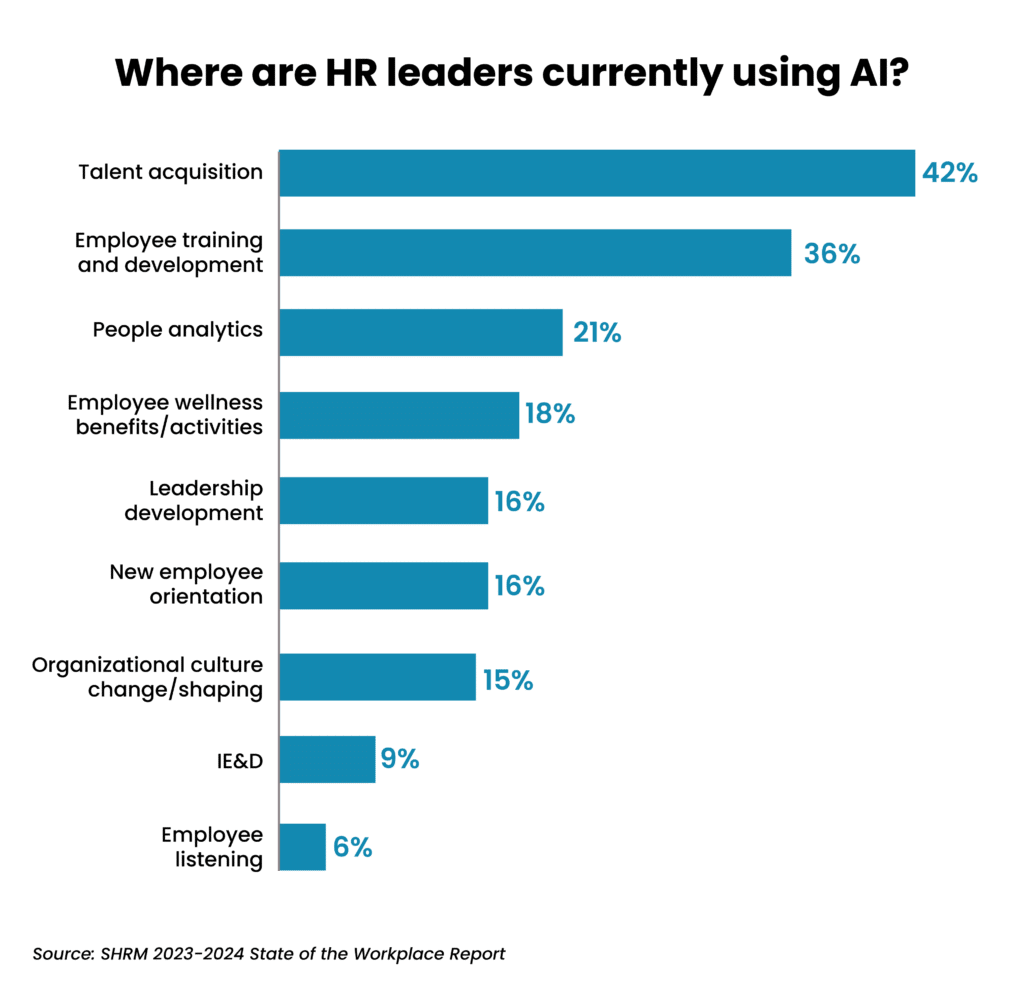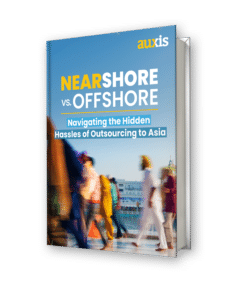In brief:
- Talent shortages, high turnover, and overwhelming workloads are impacting the ability of HR departments in the U.S. to meet organizational goals.
- The benefits of outsourcing human resources are compelling, providing the people, processes, and technology to drive efficiency, bridge talent gaps, and let internal teams focus on what matters most.
- Nearshore outsourcing has emerged as the preferred choice for North American organizations, combining lower costs with real-time collaboration and HR talent familiar with U.S. business practices, culture, and regulations.
Many human resources (HR) teams in the U.S. are overworked and stretched thin – confronting high turnover and labor shortages internally at the same time demands on their department continue to grow.
According to Gartner’s “Top 5 Priorities for HR Leaders in 2024” report, nearly 50% of company employees view their current performance as unsustainable – meaning they are likely to leave their jobs soon. Also, only about 50% of employees say they trust their organization – a key sign of low satisfaction.
In such a climate, a high-performing human resource department that contributes to a happy and effective workforce is essential to business success. This means going above and beyond administrative tasks to hear – and address – employee concerns and boost retention rates by focusing on employee well-being and satisfaction.
But even as HR workloads increase, only 19% of HR executives expected to add new staff this year, according to the “2023-2024 State of the Workplace” report by the Society for Human Resource Management (SHRM). The result: Nearly 60% of HR professionals are taking on extra workloads and a similar number (56%) report a lack of manpower – triggering a high risk of turnover.
HR outsourcing offers a solution to these urgent challenges. By outsourcing HR functions and delegating daily tasks like payroll processing, benefits administration, and HR help desk support to quality external providers, companies can alleviate the strain on their internal teams, significantly reduce operational costs, and achieve efficiencies through best practices and automation that enable them to do more with less.
U.S. organizations are increasingly turning to the benefits of HR outsourcing – with 42% of global HR outsourcing market growth projected to come from North America over the next two years.
4 reasons human resources outsourcing can improve your HR department
HR ranked as the third-most outsourced function on Deloitte’s latest Global Outsourcing Survey, with 57% of organizations relying on third-party providers to support HR processes. Let’s examine four key advantages that HR outsourcing can offer your organization:
1. Gain instant access to experienced HR talent
Less than 10% of HR departments are currently achieving “functional excellence,” according to a 2023 Gartner survey of HR leaders. This deficiency is due in part to the increased burden on short-staffed HR departments causing burnout.
One of the main benefits of outsourcing HR services is direct access to a deep pool of top HR professionals. Traditionally, many companies hesitated to outsource HR because of the close contact it requires with employees. However, the rise of remote work post-pandemic has made organizations comfortable managing high-touch functions like HR remotely – under the right circumstances.
The shared or similar time zones and neutral accents that are familiar to U.S. workers in top nearshore destinations have helped make Latin America the preferred HR outsourcing choice for North America. Organizations based in the U.S. can expect quick resolution of issues and efficient communication between employees and nearshore HR teams, avoiding the frustration and delayed responses often associated with doing business across faraway time zones.
Demanding real-time response from Asia-based outsourcers doesn’t necessarily drive seamless service. Asia’s saturated job markets leave offshore providers struggling to hire and retain high-level, “A team” resources for overnight shifts that match U.S. business hours, leading to quality concerns, high turnover, and increased labor costs.
HR is also not a main processing service in Asia, making it difficult to find talent familiar with the nuances and complexities of managing U.S. HR functions.
By comparison, HR ranks as one of the top three shared services functions in top nearshore markets like Costa Rica – and the U.S. is the largest country supported, according to data from CINDE, the Costa Rican investment promotion agency. Costa Rican HR talent is deeply familiar with U.S. business practices, regulations, and compliance requirements – stemming from greater cultural affinity with the U.S. and 84% of Costa Rican SSOs supporting North America companies, CINDE reports.
After struggling to adequately perform HR functions in India, a Fortune 50 retailer found success outsourcing processes ranging from Level 1 and 2 HR help desk support to its end-to-end HR administrative and recruiting processes at Auxis’ Global Delivery Center in Costa Rica. Read our case study to learn more about how Auxis’ nearshore HR outsourcing solution solved the Fortune 50 retailer’s Asia-based challenges and created a seamless extension of its internal team.
Fortune 50 Retailer Adopts HR Shared Services in LATAM
2. Optimize processes and employee experiences with best practices and automation
For many businesses, investment in HR is prioritized last because the function is often seen as a cost center and not a driver of revenue. And yet, companies expect HR to work just as effectively as other departments.
Not surprisingly, reducing costs and increasing efficiencies is a top priority for 68% of HR leaders in 2024, according to the SHRM State of the Workplace report. But only 31% said they were able to achieve these goals very effectively last year.
The right HR outsourcing partner solves this issue by bringing best practices and expertise that many organizations lack internally, as well as access to the latest AI and automation tools without a big upfront investment. A quality HR outsourcing provider is more than a low-cost staffing solution, offering a proven ability to optimize processes, leverage new technology, and identify opportunities for improvement for HR organizations across industries.
Automation and AI-powered tools are vital to boosting HR efficiency, bridging labor gaps, and improving employee experiences. They offer tremendous potential to streamline mundane tasks like screening resumés and managing benefits enrollment, personalize experiences like employee training and onboarding, leverage predictive analytics, and quickly crunch large volumes of data to drive informed decision-making across talent acquisition, workforce management, and more.
But technology adoption and the use of AI tools to streamline HR processes is a main area where internal HR teams are struggling. More than half of HR leaders say their current HR technology does not meet business needs, the Gartner report states.
And while 76% of HR leaders surveyed by Gartner said they believe they will be lagging in organizational success if they don’t adopt AI within the next 12-24 months, 60% say they are unsure about the best path forward.
Extensive resources also need to be allocated to train HR staff in AI tools and automation. However, HR departments that are already stretched thin are more likely to direct their resources toward day-to-day urgent matters – generating a skills gap that increases costs in the long run.
Hiring a quality HR outsourcing provider is a smart fix that can help bring focused expertise for identifying the best automation and AI opportunities, selecting the right tools for your organization, prioritizing a roadmap, and achieving sustainable digital transformation success.
Exceptional providers also have the expertise and best practices to optimize HR processes before automating – ensuring your organization doesn’t just run faster, but smarter.

3. Reduce costs without sacrificing quality
Amid inflation and labor shortages, HR salaries in the U.S. reached their highest level in 20 years in 2023 – and HR stands as the second-highest area of increased compensation investment in 2024, according to a SHRM salary report.
A quality HR outsourcing partner lets you access skilled HR talent at a fraction of the cost. Top nearshore locations like Costa Rica, Colombia, or Mexico can deliver average labor arbitrage of 30-60% compared to hiring similar roles in the U.S. – while also absorbing costs associated with recruitment, training, overhead, and administrative burdens.
In addition, your HR outsourcing services provider should deliver cost savings by regularly measuring productivity and KPIs. With higher visibility and a continuous improvement mindset, the cost to serve tends to improve given the increased efficiencies.
And bonus: All these cost savings can be invested back into the organization to fund digital transformation initiatives that drive additional efficiencies and savings.
But with today’s market conditions driving a need for white-glove HR services that increase employee satisfaction, HR leaders are also realizing the need to look beyond the lowest outsourcing cost to ensure the highest performance.
While Deloitte’s outsourcing survey reported that 32% of enterprise leaders plan to increase their budget for traditional, transactional solutions solely focused on cost reduction, 67% said they are increasing budgets for next-gen, strategic outsourcing partnerships that combine lower costs with the ability to design and execute digital strategies, provide actionable insights, deliver more advanced process tiers, and structure an outcome-driven approach.
Nearshoring provides a compelling alternative to the traditional Asia-based offshore model in this landscape. While Asia’s value proposition often hinges on labor arbitrage – necessitating a volume-driven, one-size-fits-all approach – top nearshore providers prioritize strategic partnership that offers greater opportunities for flexibility and customization.
This distinction is particularly significant in HR, where cultural alignment, language proficiency, real-time communication, and high-performance teams trained to your specific HR policies and procedures are non-negotiable.
While Asia-based models might seem slightly cheaper upfront, the total cost can be higher in the long run once you consider its hidden costs like travel expenses and notoriously high turnover rates that impact consistency and performance. Staff unfamiliar with U.S. HR nuances can also lead to errors in complex areas like payroll, benefits, and compliance that drive additional cost.
4. Reduce HR turnover while gaining bandwidth for strategic work
In the scramble to recruit and retain talent in today’s labor market, HR scope has expanded significantly. Besides the wealth of daily administrative tasks that drive employee experience, teams are tasked with adding innovation to the recruiting process; creating a strong company culture; increasing employee benefits, perks, and work-life balance; providing upskilling, employee training, and development opportunities; and more.
More than 90% of HR leaders ranked the amount of work piled on their plates as their biggest obstacle to success in 2024, SHRM reports.
The right outsourcing partner can provide your in-house HR team with relief from the day-to-day administrative duties that consume their bandwidth, allowing them to spend their time on strategic activities that are more applicable to their cost and skills.
At the same time, exceptional partners can help you improve employee loyalty and engagement – holding themselves accountable to service-level metrics like payroll accuracy and fast employee response and resolution that drive greater satisfaction.
Reducing HR workloads and allowing internal staff to focus on more interesting and important work is key to reducing HR burnout and turnover. As the burden on HR teams grows, 28% of HR professionals said they intended to seek employment in another organization during 2024 – about 10% higher than the average across all industries, according to SHRM’s State of the Workplace report.
Continuous churn has serious impact on HR organizations – contributing to inconsistent communication with employees, delays in resolving issues, and lack of employee trust.
By taking over repetitive yet unavoidable tasks, HR outsourcing reduces stress and gives internal staff the bandwidth to grow within their roles – developing the skills to adapt and succeed in today’s fast-changing work landscape.

Why Auxis: Delegate daily HR tasks and focus on what matters most
Modern challenges have led to a surge in HR outsourcing. But not all outsourcing solutions are created equal – and companies are increasingly finding success with quality nearshore providers like Auxis, combining significant cost savings with real-time communication and highly skilled HR talent that allow them to function as a seamless extension of your internal team.
With the people, processes, and technology to keep your daily HR operations running smoothly, Auxis’ HR outsourcing solutions free up HR departments to focus on the strategic initiatives that matter most to business success.
Want to learn more about HR transformation through nearshoring and automation? Schedule a consultation today with a trusted HR outsourcing company! Or, visit our resource center for more HR outsourcing tips, strategies, and success stories.



